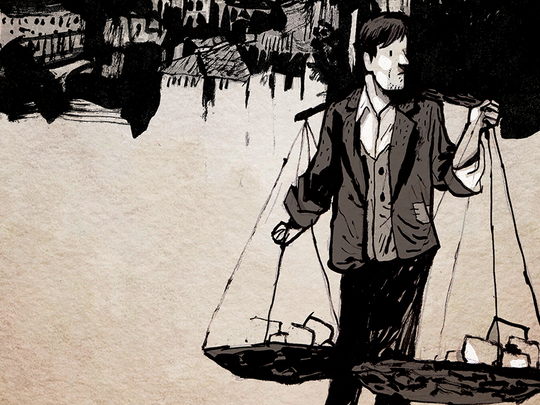
A Strangeness in My Mind
By Orhan Pamuk, translated by Ekin Oklap, Knopf, 624 pages, $29
The invention of Turkey in 1923 by Mustafa Kemal Ataturk and his fellow officers entailed an imaginative severing from its Ottoman roots. Though the Ottoman rulers had begun to become westernised, the new nation presented itself in opposition to the Ottoman past in policies, dress, writing, manners and speech, and Ataturk himself sought in neglected local traditions a different history from the one the Ottoman rulers had long chosen.
The literature that grew from this other past was decidedly modern, and its inspiration came from 19th-century and early 20th-century Europe, especially from France. Baudelaire, Balzac and Zola were found in the libraries of most young Turks.
Though several of Orhan Pamuk’s novels stubbornly hark back to that condemned past (“The White Castle”, “My Name is Red”) or look at contemporary tragedies with a borderless eye (“Snow”), the principal character of much of his most important fiction is the city of Istanbul itself, where Pamuk was born in 1952. His first novel, “Cevdet Bey and His Sons”, and later “The Black Book”, tell the story of Istanbul through the lives of affluent westernised characters.
Now, in “A Strangeness in My Mind”, translated by Ekin Oklap, Pamuk has taken up the same story but this time through the eyes of a street vendor, Mevlut, who trades in yoghurt, rice and peas, and boza, the emblematic Turkish drink of fermented wheat.
The reader follows Mevlut through the sprawling plot, which winds its way in and out of the poorer neighbourhoods and the ancient alleys and passages of Istanbul. Though at times it reads as a cross between a history manual and private memoir, “A Strangeness in My Mind” is above all a love letter to the city in all its faded, messy, dusty glory.
Constructed as a cantata for many voices, the novel allows each character to tell his or her portion of Mevlut’s unfolding story. Born in a poor village in the province of Konya, about 1,100 kilometres southeast of Istanbul, in 1957, Mevlut leaves his home 12 years later and follows his father to Istanbul.
There begins a succession of failed attempts at schooling, small businesses, political engagements. On a visit to the house of acquaintances, Mevlut falls in love with a 13-year-old girl. Over three long years, he writes her love letters, which he entrusts to her brother, saying he wants to marry her.
At last, the brother arranges an elopement. All is set for the couple to flee, but, just before boarding the train, Mevlut discovers that the girl the brother has brought with him is not the one Mevlut had fallen in love with, but her older sister.
Mevlut says nothing, accepts his fate, and attempts to understand the new love that is born from the trickery. His attitude is not one of resignation, but of gratitude for unexpected gifts. Mevlut’s life is one of ongoing generous recognition and marvelling acceptance of such revelations.
In his memoir “Istanbul: Memories and the City”, Pamuk writes of his reverence for the early 20th-century Turkish novelist Ahmet Tanpinar, who also placed Istanbul at the centre of his fiction. Tanpinar’s greatest novel is “The Time Regulation Institute” (recently published in Penguin Modern Classics), an absurdist romp through the city’s fragmented history.
But Tanpinar also wrote a Proustian novel, “A Mind at Peace”, a nostalgic evocation of Istanbul, and echoes of Tanpinar’s bittersweet urban saga can be heard in “A Strangeness in My Mind”. Pamuk’s title comes from Wordsworth; the line is followed by: “A feeling that I was not for that hour,/ Nor for that place.” This state of being is also Mevlut’s: not a saint but a wilful outsider, a stranger to the greed and selfishness prevalent in his society.
In Pamuk’s early novel “Silent House”, a young man attempts to continue his father and grandfather’s ambitious plan to compile an encyclopaedia “of everything”. “A Strangeness in My Mind” is almost just such an encyclopaedia: a vast collection of characters, events, houses, food, objects that, the reader realises at the end of 600 pages, are summed up in the name Istanbul.
–Guardian News & Media Ltd
Alberto Manguel’s latest book is “Curiosity” (Yale).








